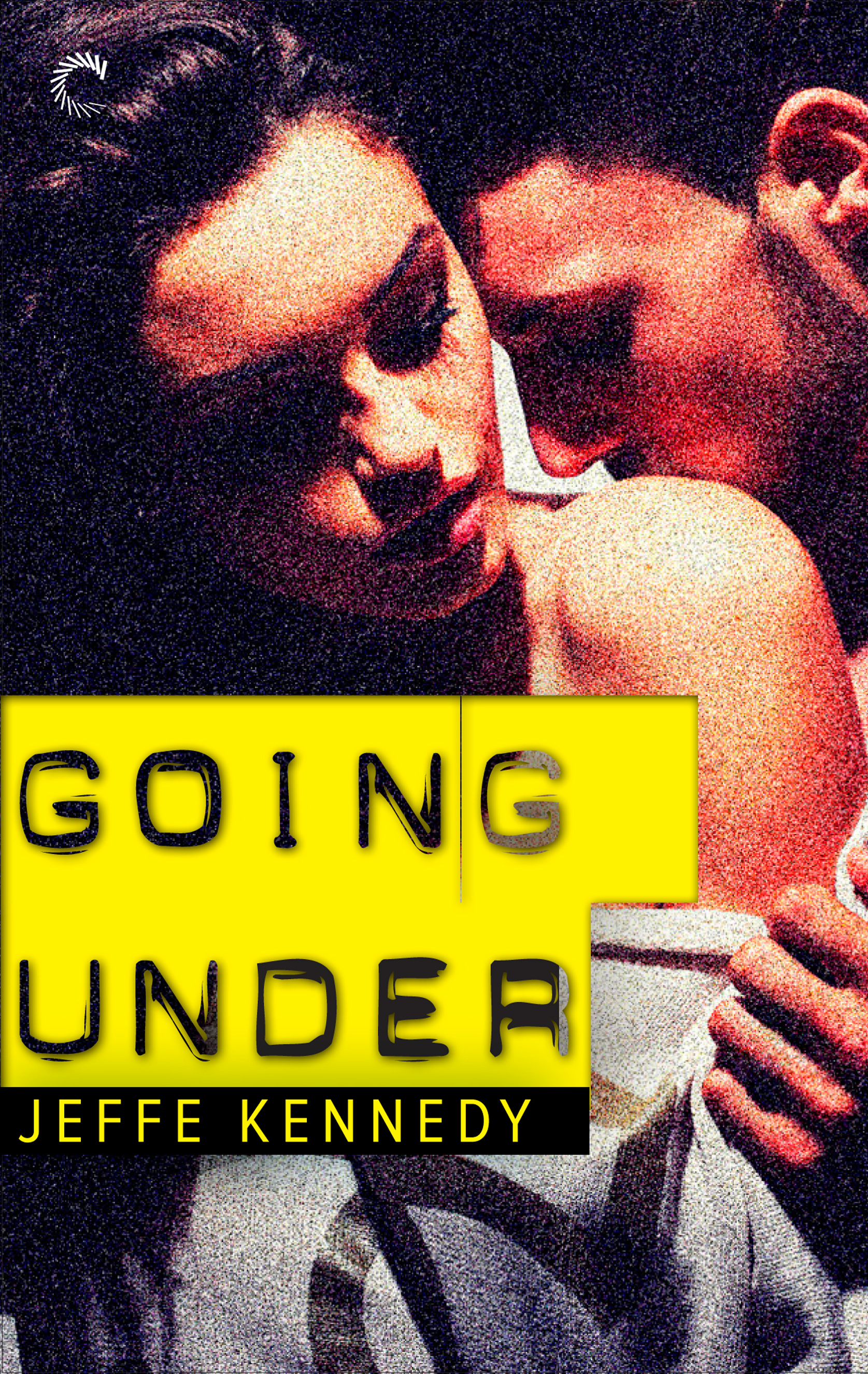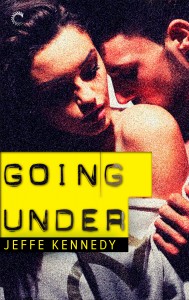My Friday Freakout and how even experienced authors have emotional crises about their books, along with insight on shaken baby syndrome in books, how interruptions cause issues, and Longshot: an underrated movie.

RITA ® Award-Winning Author of Fantasy Romance

My Friday Freakout and how even experienced authors have emotional crises about their books, along with insight on shaken baby syndrome in books, how interruptions cause issues, and Longshot: an underrated movie.


More on critique groups and workshops, how to tell if crit is toxic and what to do about it, critique during the drafting stage vs during revision, and my extended analogy of shaken baby syndrome and how it applies to early drafting.

Transcript
00:03.15
jeffekennedy
Good morning, everyone! This is Jeffe Kennedy author of epic fantasy romance I’m here with my first cup of coffee.
00:14.70
jeffekennedy
It’s actually my second cup of coffee I have had a morning people. Ah I will tell you that today is just say it with me Friday woo which is good and bad I can’t believe it’s already friday. August Twenty sixth and if you’re on video. You’ll see that I’m recording inside I recorded one podcast already outside in the grape arbor and it was a really good podcast I mean I I feel like I can say that now. Because um, well I feel like I can say it because ah it’s gone. It’s lost forever I kept getting these weird alerts as I was talking and they were annoying.
01:09.73
jeffekennedy
So so this morning. Ah yeah I don’t know why I kept gaining these alerts they were annoying me apparently the alerts meant that I all know that my part of the podcast wasn’t recording and. Since I’m the only part of the podcast I don’t know it’s I mentioned yesterday that Zencastr totally changed their thing while I was gone and now it’s messed up charming. So I’m re-recording. Here it is 10 in the morning normally I like to have my podcast totally done uploaded before 9 and have an hour of writing done by now and here I am recording my podcast I was trying all the recover backup things on it and had spent like an hour and finally I thought well. Better to just rerecord so the lost podcast ah I felt like I said some really good stuff all right anyway, I’m trying to let that go move on with my life I am going down to. Ah, Bubonicon this afternoon going to Albuquerque so I’m on the timeline and so so I’m basically screwed I’m also really fussing with this camera that is the exciting news that.
02:43.70
jeffekennedy
My aunt for my birthday gave me this New Webcam and so I only use it when I’m inside I tried using it outside yesterday and spent way too much time getting that to work. Um, technology here. So this is on my monitor now. So. So. It’s a lot better and it’s pretty isn’t that if you’re on video. It’s pretty so anyway, um, I wanted to address some things. Hopefully I’ll talk about them. Well so add ons to yesterday I appreciated the many comments I got. There were some wonderful insights and glad that my rambling made some sense so continuations from yesterday I realized that I’d never explicitly answered. Um. Or finished a thought I suppose I should say on toxic crit because I do get asked that a lot when I’m mentoring or doing author coaching and it it’s hard to know when critique is. Harsh versus when it’s toxic. So and and the answer is probably not a perfect one because the answer is is that you just have to know you have to sense it and I will explain so.
04:20.10
jeffekennedy
The thing to keep in mind is that when people give critiques they are not always um, they don’t always have your best interests at heart. Ah, people are jealous. People are competitive. People also have lots of their own shit going on in their heads that lead them to ah vent that shit in um, ways that are not great for you. Some people don’t have that going on but you don’t really know. So with a critique. Ah the rule of thumb but still applies for this that you give it 24 hours or 48 hours or a week ah to to sit and to let your own emotions attach detach. From the thing once your emotions have detached then you can come back and look at it and you can see are these my feelings or are they coming from somewhere else because you are always always always going to have feelings. Nope I’m gonna sneeze hold on. You’re always going to have your own feelings. About critique and that’s just that’s way it goes. It’s natural. Um, we all secretly hope that somebody will tell us that what we’ve written is perfect and transcendent and if you’ve asked someone to give critique. They’re always going to find something to tell you about it.
05:51.37
jeffekennedy
And sometimes it’s painful to hear and that’s just natural. That’s part of the process. But sometimes what they are telling you is not well meant they don’t have your best interests at heart. Um, their own poison has come out. And leaked onto the page or into their words and and it is quite literally toxic to your creativity. So that’s the thing to keep in mind um, give that waiting time and then if. After the waiting time you still feel. Ah, okay, so now I’m paying attention to these alerts that are popping up and it’s telling me it’s having problems saving the local backup which is new and irritating. And it’s entirely possible I’ll lose this podcast too. We um 1 thing about this though is once I stop it I cannot come back and um restart it. So I’m just gonna keep talking and. We’ll see what happens so um, okay, so keep in mind that as a creative and we know that you’re creative or you would not be listening to this particular podcast I know a lot of readers listen to this too for insights into the process. But.
07:26.55
jeffekennedy
If You’re a writer if you’re a creative you are you have intuition you have emotions and feelings. Otherwise you wouldn’t be able to write the things you write. So You have to learn to trust those feelings and you have to learn to divide out your own feelings. Of you know things like um, chemical imbalances anxiety emotions that are coming from other places like dealing with family drama or things like that from what you are intuiting.
08:03.44
jeffekennedy
That’s coming from the person giving you the critique. So Not always always easy, but this is part of being a human being right? So we have to find ways to separate our real emotional responses. From those that are coming from other sources. So You know like feeling fear and anxiety about May may not mean that you need to fix a situation. It may mean that you have a chemical imbalance that needs Addressing. Or it may mean that you are anxious about this other situation and it’s bleeding over into this thing right? That’s part of being human so you separate these things you learn to divide it out So That’s part of what the waiting period does is that lets you separate your feelings. Just receiving critique in general from your feelings about that specific Critique. So Then what you do is after that waiting period You know you clear your mind and wait till you’re in a calm space and then you take a look at whatever notes you might have on it. And this is what I did I was in a cri group I’d been unhappy for a number of months I was never thrilled with the critique I was getting but I thought well you know I’m trying to move up to a new level this I’m trying to learn a new thing working with different people.
09:33.99
jeffekennedy
So I was really giving it the old college Try. So I come back from a particularly disheartening session I’d been working up a new book that I was going to go on submission with with my agent and I’d come away feeling really disheartened. From this crit group Session. So This is another sign. Um, ideally you should come away from crit sessions feeling excited and feeling like you know what? you’re gonna work on that is like oh okay I have insight I have inspiration I have ideas I’m gonna. Go forward with this if you come away feeling crushed. That’s a clue that’s a clue that that something’s gone Wrong. So Then what I did was I let that week go by I looked again at the manuscript. Some people are printed it out and made notes. And I looked at my own notes that I had taken as they were talking and as soon as I looked at the notes particularly from a certain person I just felt bad I felt that toxicity again. So That’s how I knew and I took those pages and I. Burned them which made me feel much better and sometimes that’s what you need to do as it seems dramatic but you have to clear that shit out of your life and out of your creative process. Ah, and I also burned my own notes on it and separated myself you know and then I went on.
11:10.14
jeffekennedy
To sell that particular book in a 3 book deal. So you know I feel like I I trusted my own intuition and I trusted what I was trying to do so That’s that that’s how you know if crit is toxic. Um. And in the end it comes down to if you feel like it’s toxic if you feel like it’s not benefiting you then that is the truth. Um, the only way that this can turn out badly if you don’t take people’s crit is you run the risk of of not becoming better. You run the risk of becoming someone like and this usually happens to very advanced authors who begin to believe that they are the best thing ever. You know like um, you know seeing an interview with Anne Rice once where she you know said well believe me, no one edits me and she was hugely successful I mean she was making tons of money. But arguably her books needed to be edited at that point in time and you know maybe she didn’t feel that way I mean obviously she didn’t feel that way. Maybe she was happy with the level of success that she had you know who am I to say she should have had those books edited. That’s that’s the only risk you run. You know, otherwise it’s if you decide that you’re not going to take critique from someone. You don’t have to trust yourself, it’s it’s your book. It’s your creative process. The other caveat I would throw in there is people who.
12:45.91
jeffekennedy
Ah self-published books that aren’t ready to be self-published. Um, you know if you don’t listen to the feedback you’re getting you run the risk of putting out a book. That’s not ready, but you have to sort those things out for yourself. Um. You are the one who will care most about your work always always ever. So another point that someone made and I’ve forgotten your name so apologies. But someone commented that it makes a big difference if it’s drafting versus revision and this is absolutely true. And one of the things that prompted yesterday’s podcast S.L. Huang’s essay on Tor dot com about writing workshops particularly science fiction and fantasy writing workshops. A lot of times what they’re doing is they are working at a drafting level and bringing those ideas to the group and workshopping them and yes critique at that level is very very different than if you are doing critique of a fully. Complete work that you are now at the revising process for some people that pressure of the critique workshop works really well yesterday I referenced Mary Robinette Kowal.
14:13.47
jeffekennedy
I happen to know that her process is very much crowdsourced. She works with a group of people who read as she writes and she retools as she goes. Um Andy Weir wrote the martian that way too. Some people love that collaborative process. And Mary Robinette comes out of a theater background and so she’s very used to a collaborative process and that really works well for her. Ah and she had commented that you’ll like after. Ah, Clarion I don’t know if it was clarion. But after a workshop like that that she had not written for a couple of years and it was because she was absorbing um to me that’s I don’t know I think that’s a sign that your creative process got a little crushed but you know I can’t speak to. You know she’s very happy with her results and she’s doing well so you know own your process right? It’s different for everyone. The thing is for many of us including yours truly the drafting process is a very fragile place to be and it is easily damaged. So if you are doing a workshop like clarion or Taos toolbox or something else where you are drafting and you are involving people in the process very early on debt can be can be difficult and note that.
15:40.57
jeffekennedy
With that kind of intensive workshopping. You are also not getting that 24 hours 48 hours one week of buffer to come back and evaluate instead you’re coming back day after day after day and getting crit from those same people. So the toxicity can build up. Um, and. So my favorite analogy for this which is content warning here I call it shaken baby syndrome. So if you don’t want to go with that analogy if that’s upsetting for you tap out now. But I find it a really useful metaphor because. When you have a new draft when you have a new story. It is like an infant. It’s um, brand new to the world. It is fragile. It’s also very easy to love your new baby.
16:34.22
jeffekennedy
And it’s It’s a wonderful stage of the process because you have this infant you can hold all of it in your Arms. You can hold it close and cradle it and it needs you and and you need it and then there’s this pure. Imperfect love between you and the new Baby. The new baby idea. But the new baby is also helpless. It is not able to feed itself. Its Bones aren’t formed yet. It can’t walk. It can’t grasp things on its own. Um, even it’s It’s a little skull. The bones aren’t hardened yet to protect its tiny Brain. Ah. It’s a vulnerable little baby and it needs lots of nurturing and this is what we do with the new story ideas we cradle it and we hold it and we feed it and we we daydream with it it naps and we nap a little bit with it and it’s.. It’s a very important part of that initial idea ah later as that story grows up and develops legs and is able to go out and like do things on its own. Ah it’s tougher. Right? Your your children grow up so you want to think in terms of who do you trust with your infant baby Idea. So if you take that infant and you hand it to someone who is the equivalent of a college.
18:08.42
jeffekennedy
Admissions person who job it is to decide whether or not that baby is ready for college and you hand them this little infant they’re going to take that child and they’re gonna hold it up and they’re gonna shake it. You know, but bla. But that’s where shake and baby comes in. Ah I know it’s gross, but it scrambles the idea right? And also they start demanding all sorts of questions right? They they want to know they ask this baby. You know what about this, you know and how do you know about? What do you know about Calculus and you know like what sort of public service have you taught. And of course it’s an infant. It can’t answer. It’s not ready yet and when they hand the idea back to you and they say well this isn’t any good. It’s not ready for college. It’s you know tap talk can’t walk I mean I were dribbled. Ah, it’s not good enough. Well of course it’s not good enough. It’s not ready for college yet. It’s not ready to put through that level of examination and when you get this baby back. It might be irreparably damaged and what you do then? So what you want to do with your infant baby ideas is you want to think in terms of. Who do you trust to hold your baby. Ah, you want someone who loves you and by extension loves your idea you want someone that you can trust to take it and nurture it. You want the fairy godmother for your infant idea right.
19:42.57
jeffekennedy
You want the fairy godmother who will take it and give it magic who will give it ideas and say ah I think this child will be a genius I think that this child is going to grow up to bring love and light to the world and. Let me give it my blessings let me give it what it needs to grow up. These are the people that you want to share your brand new ideas with and if you don’t do that You run the risk right? so. This is my extended analogy On. Um you know who do you involve in your critique process at what point you know later after your baby has grown up and it’s a teenager and it has become insolent and difficult to deal with that’s when you send it off. For the college admissions interviews and when it comes Back. You’re like okay so you’ve got to go back to summer school or you know you need to improve your ah physical conditioning. Whatever let me let me help you with this so that eventually your child your book Your story. Can graduate from college and go into the world and deal with the slings and arrows arrows of professional life. So on that note coming to try recover what I can of my morning try to get something done before I head down to Bubonicon If you’re going to be there say hello.
21:15.75
jeffekennedy
And otherwise I will talk to you all on Monday you all take care bye-bye.





This week at the SFF Seven, we’re asking: how do you know who to trust with your writing, especially early drafts and idea bouncing. Come on over for my hard-won lesson on who to trust.




 I’m over at the Contemporary Romance Cafe today, talking about how writing advice at the wrong time can give your stories Shaken Baby Syndrome.
I’m over at the Contemporary Romance Cafe today, talking about how writing advice at the wrong time can give your stories Shaken Baby Syndrome.
 Here in Santa Fe, our clouds have a golden lining.
Here in Santa Fe, our clouds have a golden lining.
Snazzy, eh?
So, when I was in Memphis a few weeks ago, talking to the River City Romance Writers (many thanks to LaTessa Montgomery for inviting me!), we had a long and winding conversation. I asked them what they wanted to hear about from me: career path, digital first publishing, writing erotic, writing short, writer’s life? They said, yes.
We ended up talking about all of those things, which made for an interesting conversation.
The thing about being a professional writer, and by that I mean, wanting to make money from your work, is that most discussions about it naturally include both aspects of creativity and considerations about the market. Neither aspect can be escaped. Stories must come from our creative selves. I know there are some authors who say they care nothing about art and treat writing entirely as a business. I suspect they simply view their creativity in a different way. And, no matter how much other writers cling to the purity of art over commercialism, we’d all like to be paid well for our stories. The demands of the market cannot be ignored.
However, I’m a believer in making sure these things occur in the correct order: creativity first, then market. If you put these two things too close together, guess what results? Yes. Shaken baby syndrome.
See, our new stories, or even story ideas, are like infants. They have soft spots in their skulls. Their plot backbones can’t hold up their heads. They can’t stand alone, much less feed or defend themselves. When we have a new story, we must cuddle it close and nourish it. Lots of quiet. Some silliness and fun. Maybe long walks and wordless humming. It’s a special, intimate time.
When your story is new, you can maybe show it to a few special people. The ones you know will coo and tell you how beautiful your baby is. They might cuddle it too and speculate on what a fabulous future your baby might have. Choose these people carefully.
Because there are other people who won’t be so careful. There’s the selfish love-interest who’d just as soon kick your baby into a closet, all the better to have your attention. There’s the careless teenager who criticizes your baby. Worst of all are the industry professionals.
It’s their job – and they’re good at it – to take your baby and shake it. To shake it hard and see if it’s neck snaps. Then they’ll hand it back to you with a sorrowful look and suggest that it might be brain-damaged. They’ll tell you your baby can’t hack it in the market.
Of course it can’t – it’s just a little baby. And now they’ve damaged it. Perhaps fatally.
Now if you grow your baby up, feed it the best nourishment, work with it to make it strong and smart then, when it walks into your agent or editor’s office, it can take a bit of slapping. And likely give back what it gets. Then they give you the happy smile and say, yes! Now this kid has got what it takes. Let’s send her out on the town! She’ll take the city by a storm!
I know this can be difficult, especially when you have an agent. After all, an agent’s job is to look over your babies and tell you which ones might make it and which she thinks you should just smother in their cribs. This happened to a friend of mine. She took her new novel idea – that she was tremendously excited about – to her agent and the agent said, Meh. She said there were too many other kids out there like it. Don’t feed it, she said. Let it die.
My friend isn’t working on it. But I know she still has that baby tucked into a back room and she’s feeding it on the sly. She can’t let it die. She loves it.
I’m totally behind that. I think she should grow this kid up, like the princess hidden away in the deep, dark forest. Then, when she’s sixteen and more beautiful than anyone else in the kingdom, she can trot her daughter out and say, see? Look at *this* kid! She could be Queen of the realm.
So, my point is, baby your new stories. Realize how fragile, how vulnerable they are. It might take a lot of time for them to be strong enough to take the vicious blows of the marketing end. Don’t expose them to that. Protect them. Be good to them. Love them.
Then bring out the tough love and put them through the wringer before they face the world.
Your stories will go on to lead brilliant lives. I just know it.